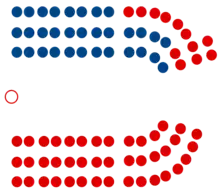37th New Zealand Parliament
The 37th New Zealand Parliament was a term of the New Zealand Parliament. It was elected at the 1972 general election on 25 November of that year.
| 37th Parliament of New Zealand | |||||
|---|---|---|---|---|---|
| |||||
.JPG.webp) | |||||
| Overview | |||||
| Legislative body | New Zealand Parliament | ||||
| Term | 14 February 1973 – 10 October 1975 | ||||
| Election | 1972 New Zealand general election | ||||
| Government | Third Labour Government | ||||
| House of Representatives | |||||
 | |||||
| Members | 87 | ||||
| Speaker of the House | Stanley Whitehead | ||||
| Prime Minister | Bill Rowling — Hugh Watt (acting) until 6 September 1974 — Norman Kirk until 31 August 1974 † | ||||
| Leader of the Opposition | Robert Muldoon — Jack Marshall until 9 July 1974 | ||||
| Sovereign | |||||
| Monarch | Elizabeth II | ||||
| Governor-General | Denis Blundell | ||||
1972 general election
The 1972 general election was held on Saturday, 25 November.[1] A total of 87 MPs were elected; 58 represented North Island electorates, 25 represented South Island electorates, and the remaining four represented Māori electorates; this was an increase in the number of MPs by three since the 1969 election, and the gain was all for the North Island.[2] 1,583,256 voters were enrolled and the official turnout at the election was 89.1%.[1]
Sessions
The 37th Parliament sat for three sessions, and was prorogued on 10 October 1975.[3]
| Session | Opened | Adjourned |
|---|---|---|
| first | 14 February 1973 | 23 November 1973 |
| second | 4 February 1974 | 8 November 1974 |
| third | 25 March 1975 | 10 October 1975 |
Ministries
The National Party, which had come to power at the 1960 election, was defeated by the Labour Party at the 1972 election. Norman Kirk formed the third Labour Government and led the Kirk Ministry until his sudden death on 31 August 1974. After Hugh Watt had been acting Prime Minister for the first few days of September 1974, Kirk was succeeded by Bill Rowling on 6 September. The Rowling Ministry lasted until the end of the parliamentary term, when the Labour Government was defeated by National in the 1975 election.[4]
Overview of seats
The table below shows the number of MPs in each party following the 1972 election and at dissolution:
| Affiliation | Members | ||
|---|---|---|---|
| At 1972 election | At dissolution | ||
| Labour Government | 55 | 55 | |
| National Opposition | 32 | 32 | |
| Total |
87 | 87 | |
| Working Government majority | 23 | 23 | |
Notes
- The Working Government majority is calculated as all Government MPs less all other parties.
Initial composition of the 37th Parliament
The table below shows the results of the 1972 general election:
Key
National Labour Social Credit Independent
Table footnotes:
- Bruce Beetham came third for Social Credit in Rangitikei
- Shand was first on election night, but lost when special votes were included
- Julian Watts was a son of Jack Watts
Select committees
For the 37th Parliament, elected from the 1972 general election, there were the following select committees in the House of Representatives, as follows:[17]
| Select committee | Portfolios/Jurisdictions | Members |
|---|---|---|
| Defence | Military affairs, defence matters, disarmament and arms control | |
| Education | Education, education review, industry training, research | |
| Foreign Affairs | International relations, immigration, overseas trade | |
| House | ||
| Island Affairs | Pacific Islands affairs | |
| Labour | Industrial relations | |
| Lands and Agriculture | Agriculture, biosecurity, fisheries, forestry, lands, and land information | |
| Library | Parliamentary library | |
| Local Bills | ||
| Māori Affairs | Māori affairs | |
| Petitions | Public submissions | |
| Privileges | Parliamentary privilege | |
| Public expenditure | Finance, revenue, taxation, audit | |
| Road safety | ||
| Selection | ||
| Statutes Revision | ||
| Trade and Industry | ||
By-elections during 37th Parliament
There was one by-election held during the term of the 37th Parliament.
| Electorate and by-election | Date | Incumbent | Cause | Winner | |||
|---|---|---|---|---|---|---|---|
| Sydenham | 1974 | 2 November | Norman Kirk | Death | John Kirk | ||
Notes
- "General elections 1853–2005 - dates & turnout". Elections New Zealand. Archived from the original on 27 May 2010. Retrieved 2 December 2012.
- Wilson 1985, p. 173.
- Wilson 1985, p. 142.
- Wilson 1985, pp. 89–94.
- Norton 1988, p. 210.
- Norton 1988, p. 213.
- Norton 1988, p. 215.
- Gustafson 1986, p. 371.
- Norton 1988, p. 229.
- Norton 1988, p. 241.
- Norton 1988, p. 243.
- "From war refugee to liberal thinker, businessman and books man". Stuff.co.nz. 4 March 2017. Retrieved 4 March 2017.
- Gustafson 1986, p. 354.
- Gustafson 1986, p. 382.
- Norton 1988, p. 360.
- Gustafson 1986, p. 388.
- Parliamentary Debates. 382. Wellington: A. R. Shearer, Government Printer. 1973. pp. 11–12.
References
- Gustafson, Barry (1986). The First 50 Years : A History of the New Zealand National Party. Auckland: Reed Methuen. ISBN 0-474-00177-6.
- Norton, Clifford (1988). New Zealand Parliamentary Election Results 1946-1987: Occasional Publications No 1, Department of Political Science. Wellington: Victoria University of Wellington. ISBN 0-475-11200-8.
- Templeton, Ian; Eunson, Keith (1972). In the Balance: Election '72. Dunedin: John McIndoe.
- Wilson, James Oakley (1985) [First ed. published 1913]. New Zealand Parliamentary Record, 1840–1984 (4th ed.). Wellington: V.R. Ward, Govt. Printer. OCLC 154283103.